Module 11 Unit 1 They touch noses!课件(共42张PPT)
文档属性
| 名称 | Module 11 Unit 1 They touch noses!课件(共42张PPT) |
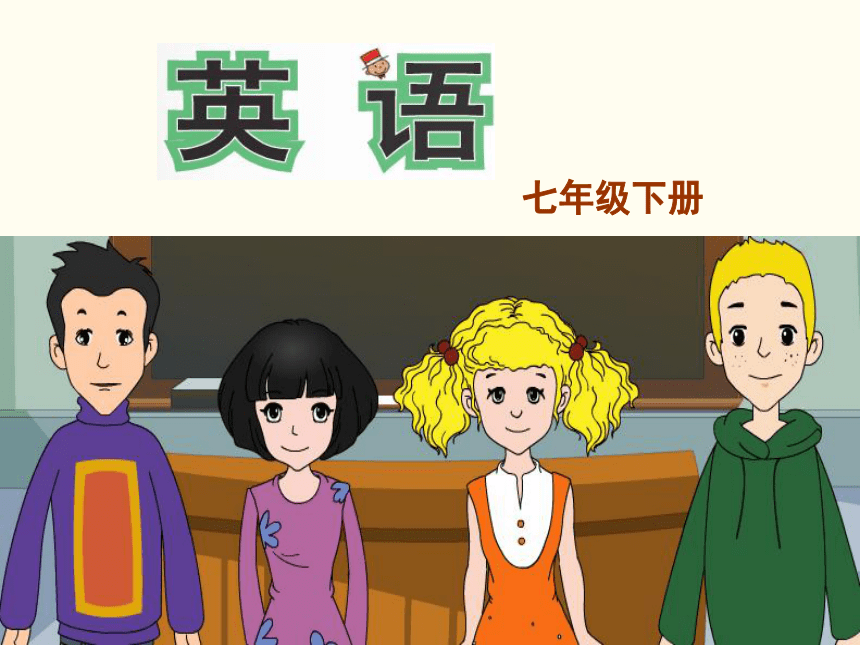
|
|
| 格式 | ppt | ||
| 文件大小 | 2.6MB | ||
| 资源类型 | 教案 | ||
| 版本资源 | 外研版 | ||
| 科目 | 英语 | ||
| 更新时间 | 2022-05-23 09:24:58 | ||
图片预览

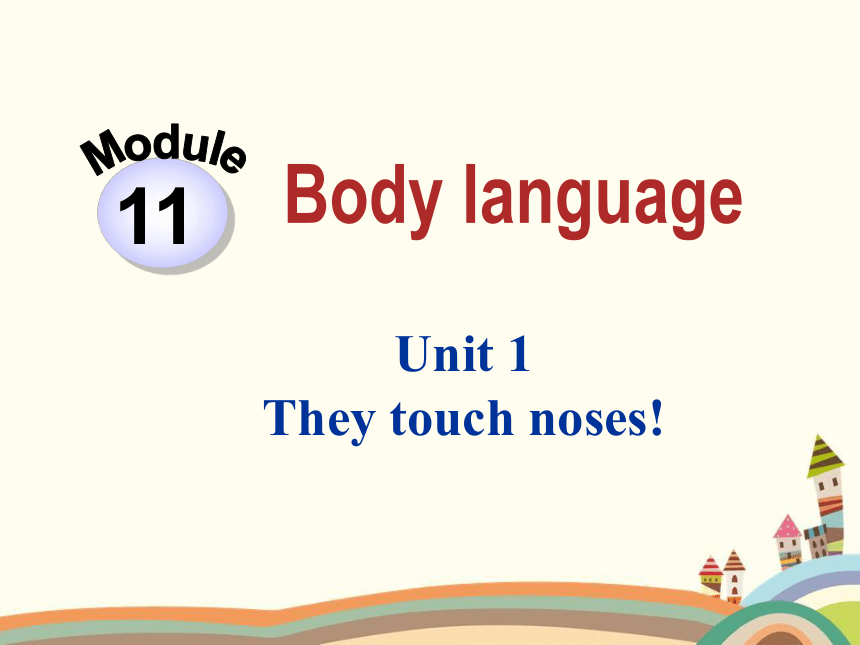
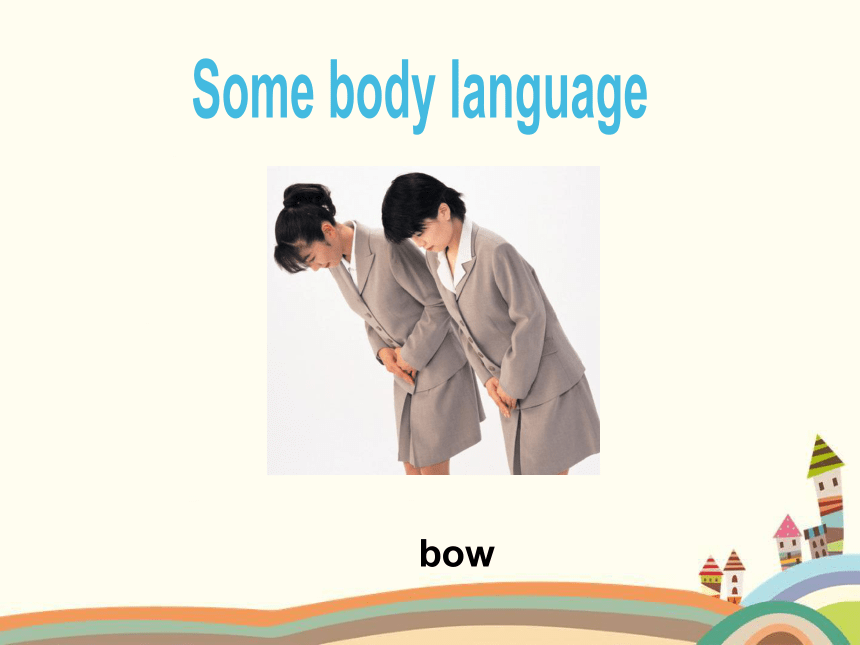
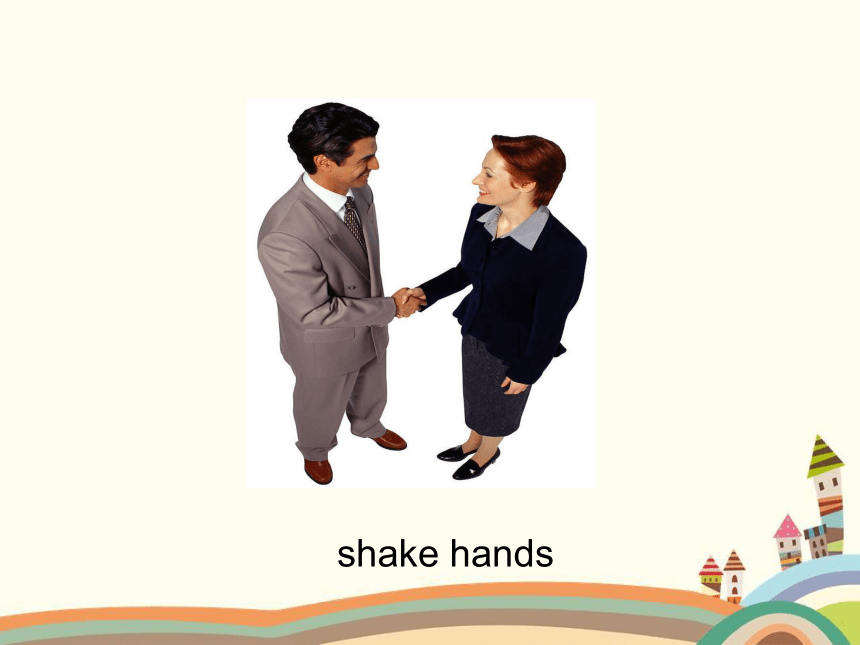
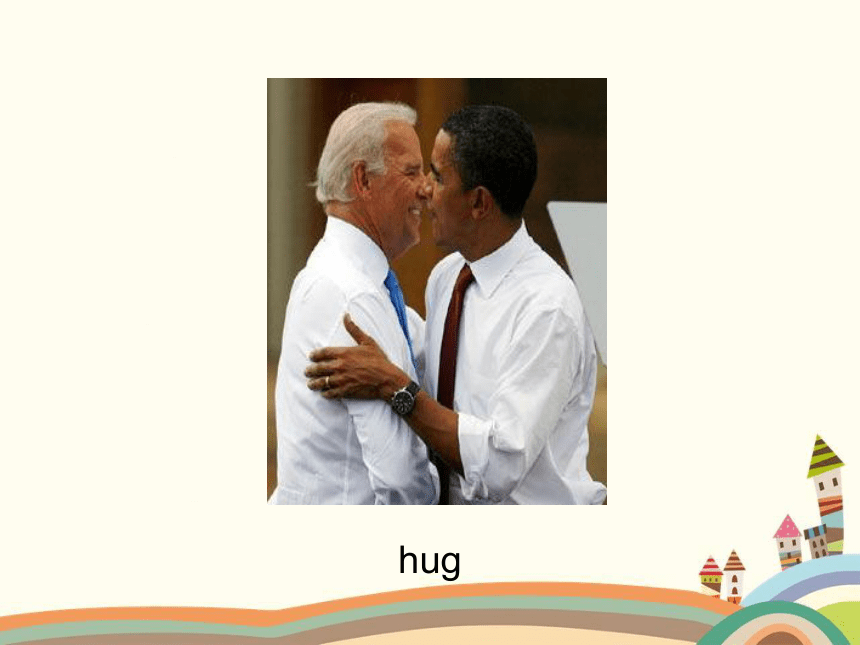
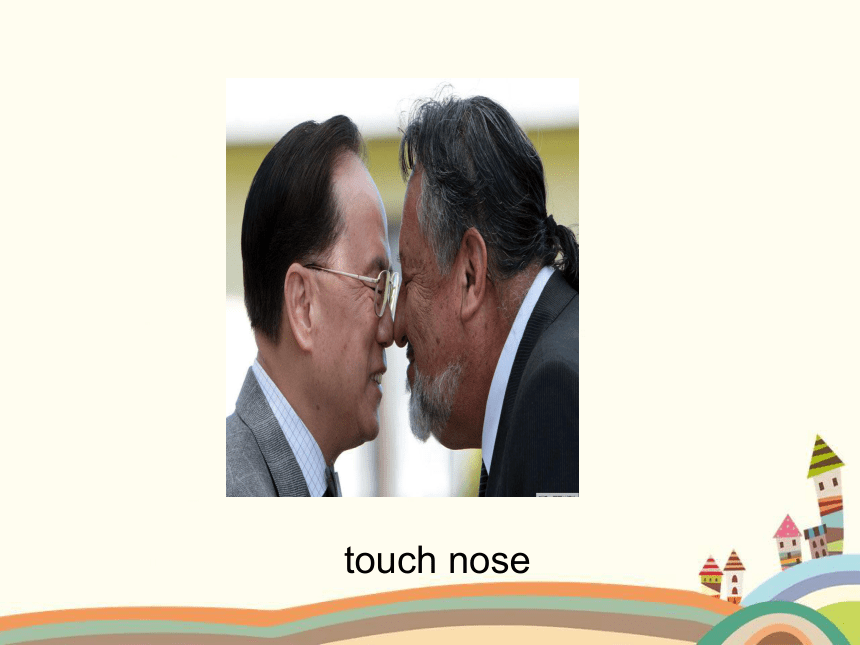
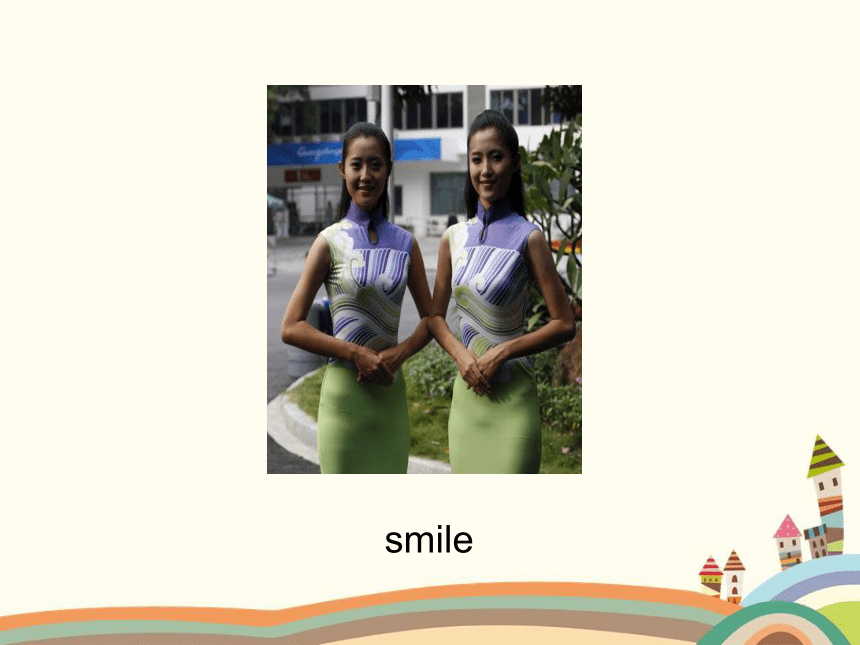
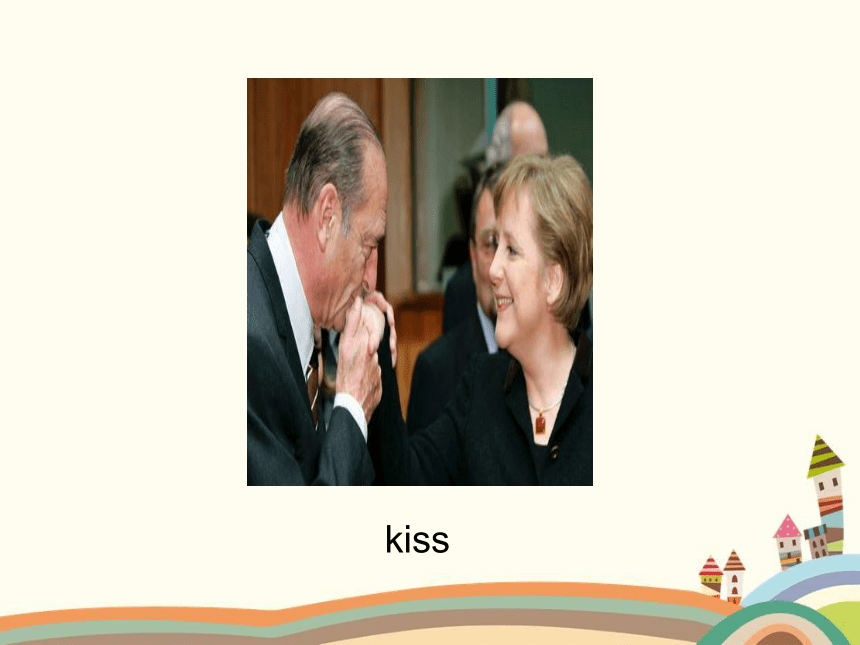
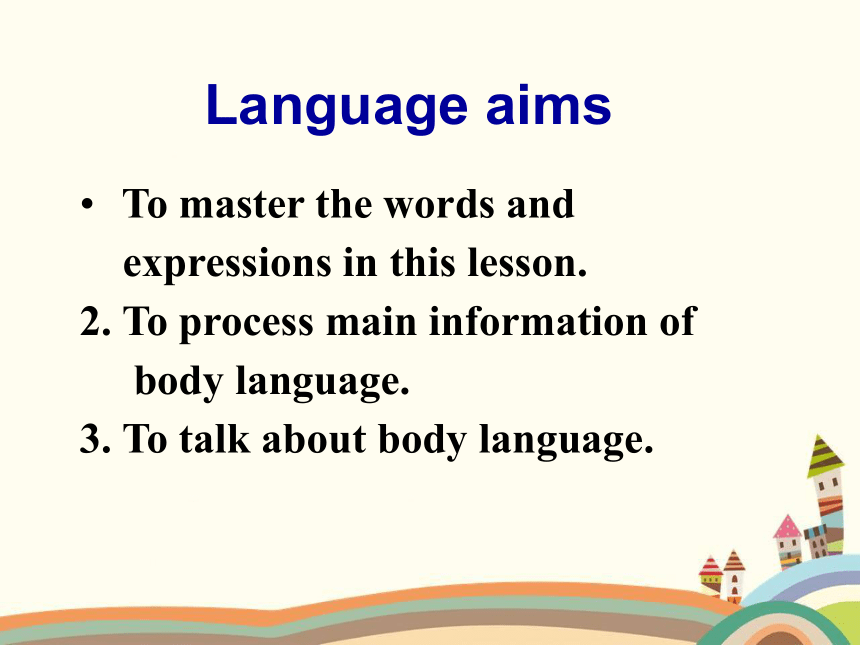
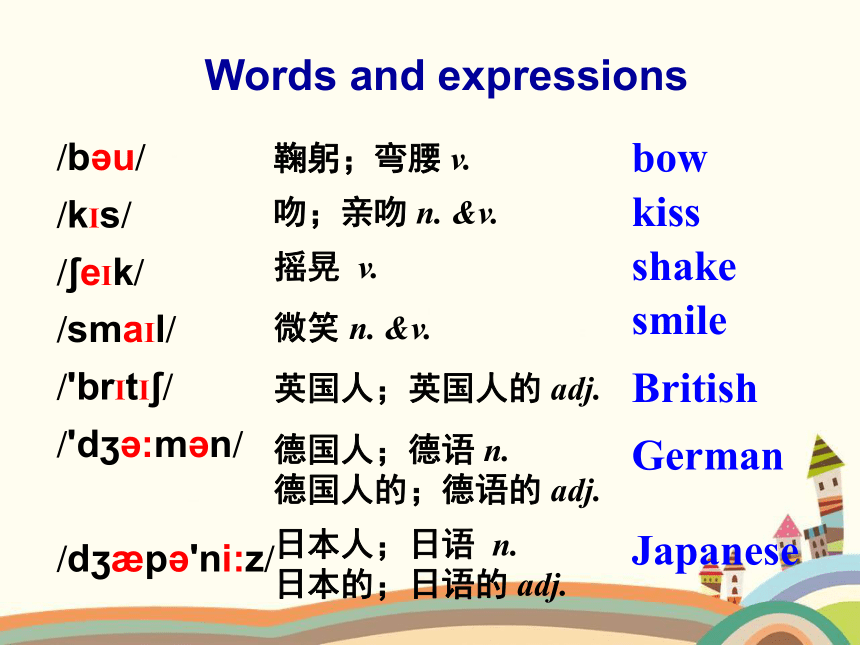
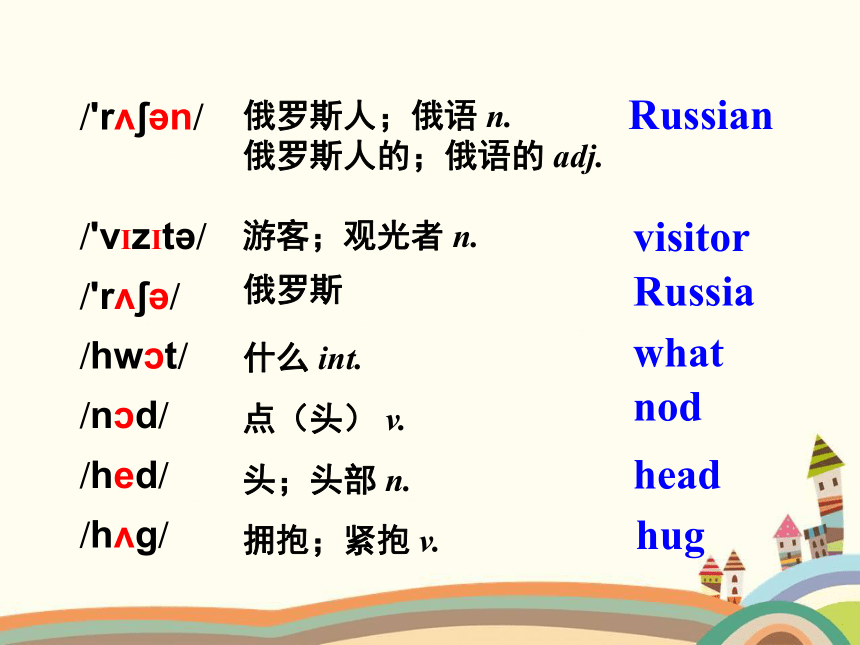
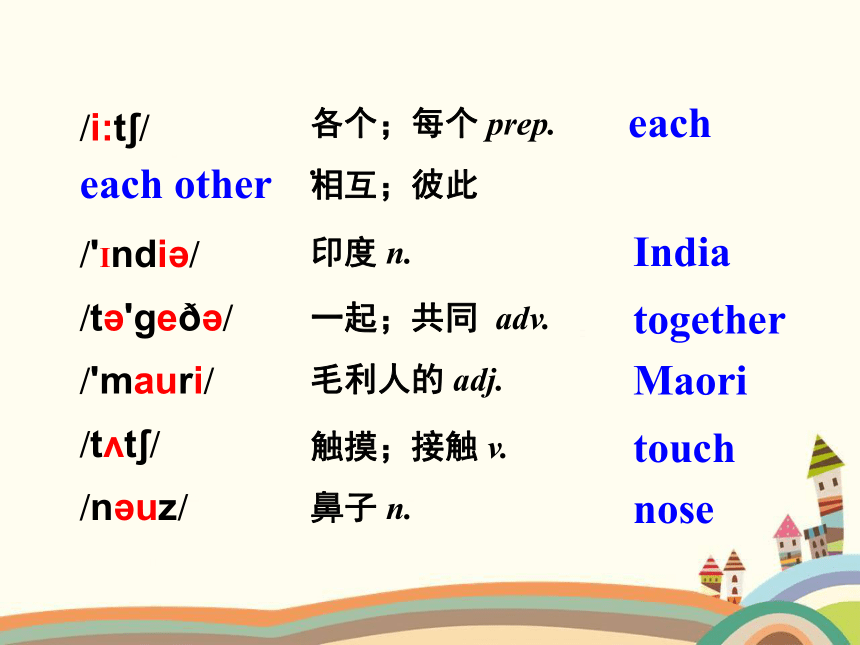
文档简介
(共42张PPT)
11
Unit 1
They touch noses!
bow
shake hands
hug
touch nose
smile
kiss
To master the words and
expressions in this lesson.
2. To process main information of
body language.
3. To talk about body language.
Language aims
/b u/
/kIs/
/ eIk/
/smaIl/
/'brItI /
/'d :m n/
/d p 'ni:z/
鞠躬;弯腰 v.
bow
吻;亲吻 n. &v.
kiss
摇晃 v.
shake
Words and expressions
微笑 n. &v.
smile
British
英国人;英国人的 adj.
German
Japanese
德国人;德语 n.
德国人的;德语的 adj.
日本人;日语 n.
日本的;日语的 adj.
/'r n/
/'vIzIt /
/'r /
/hw t/
/n d/
/hed/
/h ɡ/
俄罗斯人;俄语 n.
俄罗斯人的;俄语的 adj.
Russian
游客;观光者 n.
visitor
俄罗斯
Russia
什么 int.
what
nod
点(头) v.
head
hug
头;头部 n.
拥抱;紧抱 v.
/i:t /
/'Indi /
/t 'ɡe /
/'mauri/
/t t /
/n uz/
各个;每个 prep.
.
each
印度 n.
India
一起;共同 adv.
together
毛利人的 adj.
Maori
touch
触摸;接触 v.
nose
鼻子 n.
相互;彼此
each other
1 Match the pictures with the words
and expression from the box.
bow
kiss
shake hands
smile
2 Listen and match the pictures with the
nationality.
British
French
German
Japanese
Russian
1
3
2
Now work in pairs and check.
—Are they Russian
—Yes, they are.
—What are they doing
—They ’re shaking hands.
Everyday English
What
I didn’t know that.
Then listen and read
Lingling: We’re going to have some Russian teachers at school tomorrow, and I’m welcoming the visitors. How do I do that
Betty: Lingling. you know, in Russia, people usually kiss three times, left, right, left.
Lingling: What! No, I didn’t know that. We Chinese often shake hands and smile when we meet visitors, and sometimes we nod our heads. But we never kiss. Only parents and children do that.
do Betty: They touch noses!
Betty: That’s because people do different things in different countries.
Lingling: So what do people in the US usually do when they meet
Betty: In the US some people shake hands, and some kiss or hug each other. In India people put their hands together and nod their heads. And do you know what Maori people in New Zealand do when they meet
Lingling: No. What do they do
Betty: They touch noses!
In China, people shake hands and smile.
when they meet
_____.
American people shake hands and sometimes _____
In ______,people put their hands_________ and nod their heads.
In ________,people kiss each other three times
Maori people _______noses.
Now complete the table with the correct form of the words from the box.
India kiss Russia together touch visitor
kiss
India
together
Russia
touch
visitor
1. in Russia, people usually kiss three times.
Language points
“times” 在这里表示次数, three times 表示 “三次”
在英文中,
一次, once
两次, twice
三次以上都用“times”
如:
My mother goes shopping once a week.
我妈妈每周购物一次。
2. That’s because people do different things in different
countries.
That’s because….. 是一个常用句式,其中,that 表示刚刚谈到的内容。
注意,这里要用that,而不能用 this , 因为this 表示将要谈及的内容。如:
That’s because you were not careful enough.
那是因为你但是不够细心。
4 Listen and repeat.
/ t / Chinese each French teacher touch
/ / British shake
/pl/ people
/fr/ French
/br/ British
5 Work in groups. Talk about what you do and say when you meet.
—What do you do and say when you meet your teacher in the morning
—I smile and say good morning.
your teacher
your head teacher
your parents after school
your best friend
your best friend’s parents
your favourite film star
a visitor to your school
an American
a Russian
语法讲解----祈使句
1.—Don’t be late again, Mike
—_______________.
A. No, I don’t B. Don’t worry
C. Sorry, I won’t D. I don’t know
【解析】选C。
2.Which sign means “No Photos”
【解析】选C。禁止拍照。
3.Tom!________ talk loudly. My little brother is sleeping. A. Do B. Does
C. Don’t D. Doesn’t
4.—Sorry for being late again. —_______here on time next time, or you’ll be punished.
A. Be B. Being C. To be D. Been
【解析】选A。
【解析】选C
5.Hurry up, or you will miss the train.(改为同义句)
_______you ________ hurry up, you will miss the train.
【解析】If;don’t。祈使句+or+简单句。可转换为if引导的条件状语从句的复合句。
6.看图写句子
Which school rule is the boy breaking
答案:Don’t listen to music in class.
答案:Don’t sleep in class
答案:Don’t use cell-phone in class
Good bye!
11
Unit 1
They touch noses!
bow
shake hands
hug
touch nose
smile
kiss
To master the words and
expressions in this lesson.
2. To process main information of
body language.
3. To talk about body language.
Language aims
/b u/
/kIs/
/ eIk/
/smaIl/
/'brItI /
/'d :m n/
/d p 'ni:z/
鞠躬;弯腰 v.
bow
吻;亲吻 n. &v.
kiss
摇晃 v.
shake
Words and expressions
微笑 n. &v.
smile
British
英国人;英国人的 adj.
German
Japanese
德国人;德语 n.
德国人的;德语的 adj.
日本人;日语 n.
日本的;日语的 adj.
/'r n/
/'vIzIt /
/'r /
/hw t/
/n d/
/hed/
/h ɡ/
俄罗斯人;俄语 n.
俄罗斯人的;俄语的 adj.
Russian
游客;观光者 n.
visitor
俄罗斯
Russia
什么 int.
what
nod
点(头) v.
head
hug
头;头部 n.
拥抱;紧抱 v.
/i:t /
/'Indi /
/t 'ɡe /
/'mauri/
/t t /
/n uz/
各个;每个 prep.
.
each
印度 n.
India
一起;共同 adv.
together
毛利人的 adj.
Maori
touch
触摸;接触 v.
nose
鼻子 n.
相互;彼此
each other
1 Match the pictures with the words
and expression from the box.
bow
kiss
shake hands
smile
2 Listen and match the pictures with the
nationality.
British
French
German
Japanese
Russian
1
3
2
Now work in pairs and check.
—Are they Russian
—Yes, they are.
—What are they doing
—They ’re shaking hands.
Everyday English
What
I didn’t know that.
Then listen and read
Lingling: We’re going to have some Russian teachers at school tomorrow, and I’m welcoming the visitors. How do I do that
Betty: Lingling. you know, in Russia, people usually kiss three times, left, right, left.
Lingling: What! No, I didn’t know that. We Chinese often shake hands and smile when we meet visitors, and sometimes we nod our heads. But we never kiss. Only parents and children do that.
do Betty: They touch noses!
Betty: That’s because people do different things in different countries.
Lingling: So what do people in the US usually do when they meet
Betty: In the US some people shake hands, and some kiss or hug each other. In India people put their hands together and nod their heads. And do you know what Maori people in New Zealand do when they meet
Lingling: No. What do they do
Betty: They touch noses!
In China, people shake hands and smile.
when they meet
_____.
American people shake hands and sometimes _____
In ______,people put their hands_________ and nod their heads.
In ________,people kiss each other three times
Maori people _______noses.
Now complete the table with the correct form of the words from the box.
India kiss Russia together touch visitor
kiss
India
together
Russia
touch
visitor
1. in Russia, people usually kiss three times.
Language points
“times” 在这里表示次数, three times 表示 “三次”
在英文中,
一次, once
两次, twice
三次以上都用“times”
如:
My mother goes shopping once a week.
我妈妈每周购物一次。
2. That’s because people do different things in different
countries.
That’s because….. 是一个常用句式,其中,that 表示刚刚谈到的内容。
注意,这里要用that,而不能用 this , 因为this 表示将要谈及的内容。如:
That’s because you were not careful enough.
那是因为你但是不够细心。
4 Listen and repeat.
/ t / Chinese each French teacher touch
/ / British shake
/pl/ people
/fr/ French
/br/ British
5 Work in groups. Talk about what you do and say when you meet.
—What do you do and say when you meet your teacher in the morning
—I smile and say good morning.
your teacher
your head teacher
your parents after school
your best friend
your best friend’s parents
your favourite film star
a visitor to your school
an American
a Russian
语法讲解----祈使句
1.—Don’t be late again, Mike
—_______________.
A. No, I don’t B. Don’t worry
C. Sorry, I won’t D. I don’t know
【解析】选C。
2.Which sign means “No Photos”
【解析】选C。禁止拍照。
3.Tom!________ talk loudly. My little brother is sleeping. A. Do B. Does
C. Don’t D. Doesn’t
4.—Sorry for being late again. —_______here on time next time, or you’ll be punished.
A. Be B. Being C. To be D. Been
【解析】选A。
【解析】选C
5.Hurry up, or you will miss the train.(改为同义句)
_______you ________ hurry up, you will miss the train.
【解析】If;don’t。祈使句+or+简单句。可转换为if引导的条件状语从句的复合句。
6.看图写句子
Which school rule is the boy breaking
答案:Don’t listen to music in class.
答案:Don’t sleep in class
答案:Don’t use cell-phone in class
Good bye!
同课章节目录
- Module 1 Lost and found
- Unit 1 Whose bag is this?
- Unit 2 Are they yours?
- Unit 3 Language in use
- Module 2 What can you do ?
- Unit 1 I can play the piano
- Unit 2 I can run really fast
- Unit 3 Language in use
- Module 3 Making plans
- Unit 1 What are you going to do at the weekends?
- Unit 2 We're going to cheer the players.
- Unit 3 Language in use
- Module 4 Life in the future
- Unit 1 Everyone will study at home
- Unit 2 Every family will have a small plane.
- Unit 3 Language in use
- Module 5 Shopping
- Unit 1 What can I do for you?
- Unit 2 You can buy everything on the Internet
- Unit 3 Language in use
- Module 6 Around town
- Unit 1 Could you tell me how to get to the Nationa
- Unit 2 The London Eye is on your right.
- Unit 3 Language in use
- Revision module A
- Module 7 My past life
- Unit 1 I was born in a small village.
- Unit 2 I was born in Quincy.
- Unit 3 Language in use
- Module 8 Story time
- Unit 1 Once upon a time….
- Unit 2 Goldilocks hurried out of the house.
- Unit 3 Language in use
- Module 9 Life history
- Unit 1 He left school and began work at the age of
- Unit 2 He decided to be an actor.
- Unit 3 Language in use
- Module 10 A holiday journey
- Unit 1 What did you do?
- Unit 2 This morning we took a walk.
- Unit 3 Language in use
- Module 11 Body language
- Unit 1 They touch noses!
- Unit 2 Here are some ways to welcome them.
- Unit 3 Language in use
- Module 12 Western music
- Unit 1 It's so beautiful!
- Unit 2 Vienna is the centre of European classical
- Unit 3 Language in use
- Revision module B
